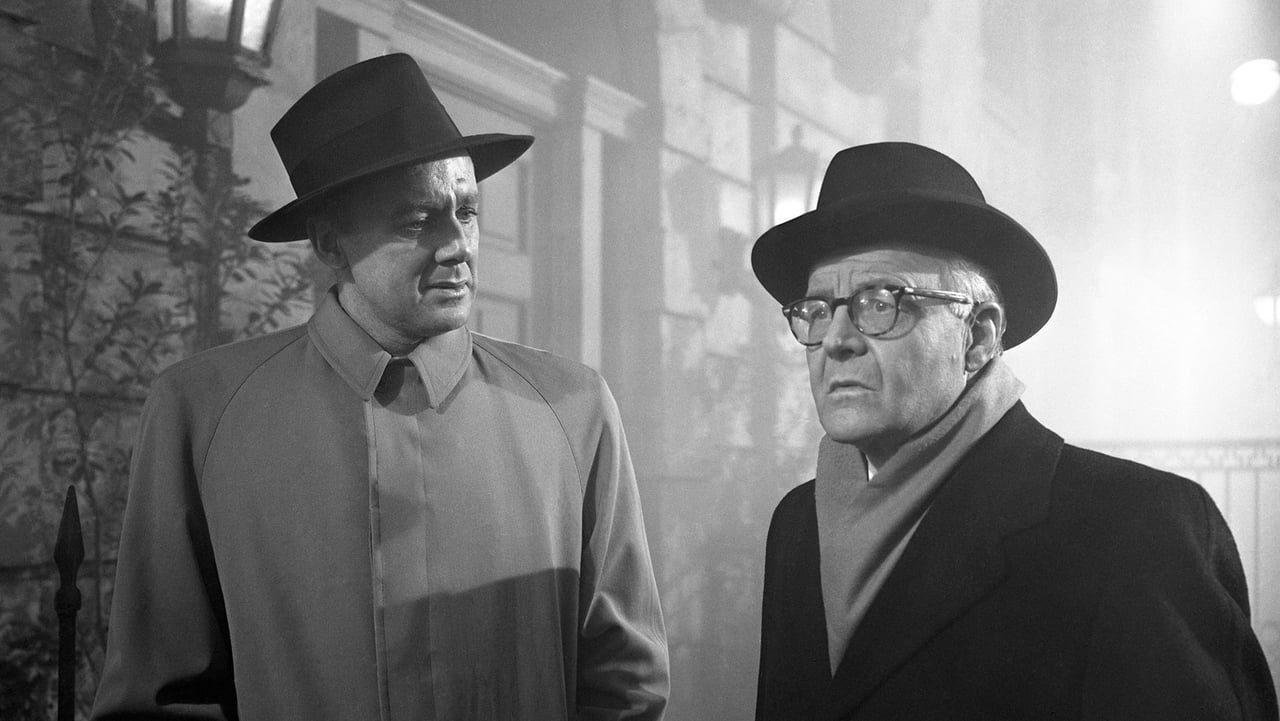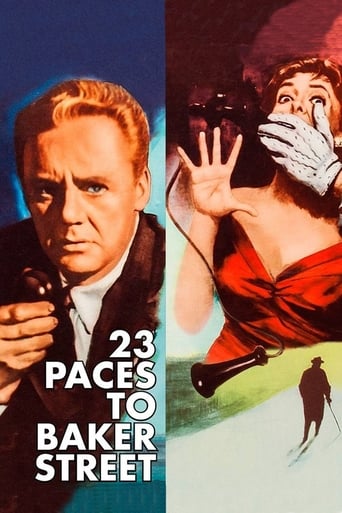Marketic
It's no definitive masterpiece but it's damn close.
Platicsco
Good story, Not enough for a whole film
Lumsdal
Good , But It Is Overrated By Some
Walter Sloane
Mostly, the movie is committed to the value of a good time.
blanche-2
"23 Paces to Baker Street" from 1956 is an excellent film starring Van Johnson, Vera Miles, Cecil Barker, and Estelle Winwood.Filmed in London in color, and taking advantage of blocked funds (money earned in England that must be spent there), this is a somewhat Hitchkockian mystery directed by Henry Hathaway. It also has shades of the later "Wait Until Dark." Philip Hannon is a successful playwright living in London. Due to an accident, he is now blind and embittered -- so much so that he broke up with his fiancée, Jean (Vera Miles). Jean hasn't given up and shows up to say hello, and as a result, becomes involved in the mystery.While Hannon was in a local pub one night, he overhears a man and a woman talking. It sounds to him like the woman is being forced to commit a crime that is to take place on the tenth. When Philip returns home, he repeats the conversation into his tape recorder and then calls the authorities. They're not interested. Frustrated, with the help of Jean and his butler Bob (Cecil Barker), he endeavors to solve it himself.Really good film filled with suspense and true mystery. Some of the end will remind you a bit of "Wait Until Dark," and I wouldn't be surprised if the playwright had seen this film. It's basically the same premise: an innocent blind person caught in a web of terror.Van Johnson was always one of those actors I never paid a bit of attention to, on my Fred MacMurray list, as one of those bland actors who replaced the real stars during the war. I was wrong about both men. Johnson in fact had a genuine likability, charm, and warmth, and was a very good actor. I saw him in an interview once and he named all the actors of his type at MGM that tested for roles along with him, and how he always got the part and the others were ready to kill him. A somewhat troubled individual in his private life, it never showed on the screen. I thought he was wonderful in this.Vera Miles is lovely as Jean, the ex-fiancée who doesn't want Philip to give up on life.Highly recommended as one of those cozy British films to watch on a Sunday afternoon.
bkoganbing
Van Johnson's highly developed senses of sound and odor go a long way in 23 Paces To Baker Street. Although there's no reference at all to Baker Street's most famous resident in literature, Johnson turns out to be quite the detective himself although he had two premises initially wrong. The blind Johnson is an American author living in London and keeping company with fellow expatriate Vera Miles. His only living companion is his valet Cecil Parker. While enjoying a drink at a nearby pub, he overhears what sounds like a criminal plot of kidnapping. Of course when he takes his suspicions to Scotland Yard they are understandably dubious.Without sight and not being able to write apparently even braille, Johnson records the conversation on his tape recorder and goes over and over it. What I liked about 23 Paces To Baker Street and Johnson's performance in it is that it shows Johnson making use of his other senses which in turn give him a kind of mission in life as opposed to being bitter about his fate. On the other hand he certainly has obvious vulnerabilities which the bad guys take advantage of. There is a harrowing scene in a bombed out building from the Blitz in which Johnson is nearly killed.Young Natalie Norwood as an unwilling participant in the plot is also a standout here. And Patricia Laffan who was both Poppaea in Quo Vadis and the Devil Girl From Mars is equally villainous here.Nice job all around with director Henry Hathaway getting great performances from Johnson, Miles, and the British cast supporting them.
dbborroughs
Van Johnson is a blind playwright in London. cranky since he lost his sight he lives a reclusive existence having driven away anyone who cared about him. He's helped along by a butler. One day when he wanders off to a pub he overhears a conversation that leads him to believe that a terrible crime-a kidnapping or murder-is going to take place. When his call to the police gets him nowhere he decides to stop the crime himself, and so with the aide of his butler and his ex-fiancé he tries to get to the bottom of the crime.Shot in a beautiful widescreen that was lost in the pan and scan version I saw (Its wide at the start and end for the titles) this is a nifty little thriller that is akin to Hitchcock's films of the 1950's. While it echoes Hitchcock's work it is decidedly its own beast with the plot and events playing out in ways that Hitch never really explored. Johnson's blindness is both a blessing and a curse and a good chunk of the tension comes from not knowing if he's in over his head. The plot is nicely crafted so that, like Johnson and his companions, we are not sure what exactly is being planned. We have to piece things together. The performances are very good with everyone nicely filling out their assigned roles.If there is a problem with the film its that film has the feel of some of the big budget films of the 50's that were made in color and on location so that people would be lured back to theaters in order to see things they couldn't get on TV. Its often too "big" for some of the small moments with shots set up to look good in widescreen, but almost at the cost of the story. Still its a minor complaint and the film looks good in the full screen edition I saw.This is one to look out for, especially if you're a Hitchcock fan, since it appears to be an under appreciated thriller.7 ish out of 10.
silverscreen888
This I assert is a minor masterpiece of film-making, which has long been underestimated by critics but never by fans. Its images, I suggest, burn themselves into the mind where other cinematic tales soon pale and are forgotten. To mention just a few scenes, the film presents a blind playwright describing the view of the Thames to the fiancé he left behind, a lovely nanny who isn't quite what she seems playing another nanny or perhaps not, a sightless man guiding a lost man through a fog, the same man discovering that a building's front isn't there and a battle in the darkness between a murderer and victim. The script, adapted from a tense Philip MacDonald novel by Nigel Balchin, was made into what I say is an expensive-looking and relentlessly beautiful film by veteran director Henry Hathway. Henry Ephron produced, and every element was realized seemingly by flawless skill, from understated music by Leigh Harline to the cinematography by Milton R. Krasne, to the art direction by Lyle Wheeler and Maurice Ransford, to the outstanding set decorations by Walter M. Scott and Fay Babock and costumes by Travilla. Add famed Ben Nye as makeup artist and the great Helen Turpin as hair stylist and it would be hard for this film to have gone anything but very right. The cast is headed by lovely young Vera Miles as the love interest and Van Johnson coming near something very fine as the blind playwright, Philip Hannon. Maurice Denham plays a befuddled police Inspector, and Cecil Parker tries hard as Hannon's assistant. Patricia Laffan has her best role since Quo Vadis as the mysterious Miss MacDonald, stealing every scene she is in. Other actors showing to advantage include within this strongly-made and taut fictional noir mystery Liam Redmond, Isobel Elsom, lively Estelle Winwood, Martin Benson, Natalie Norwick, and Terence de Marney. On the grounds of pace, intelligence of dialog and sheer memorability alone, this is a Top Hundred film, and the father to many stories starring blind protagonists from TV's "Longstreet" to "Wait Until Dark". There had been films about a blind central character before; but this Technicolor, attractive and exciting film was the project that brought the idea of such films to the minds of producers and viewers alike as none before had done. The mystery I believe is an interesting one, the characters believable from first to last, and the extraordinary work by Patricia Laffan and Vera Miles raise the film far above its competitors' best. It is clearly much better than "in the Heat of the Night", the obsessive "Vertigo" or even "Key Largo". And its makers accomplish its power without striving consciously to achieve it. Were it not for "Rear Window", the film might be considered the best 50's noir of all. I recommend it unreservedly.

